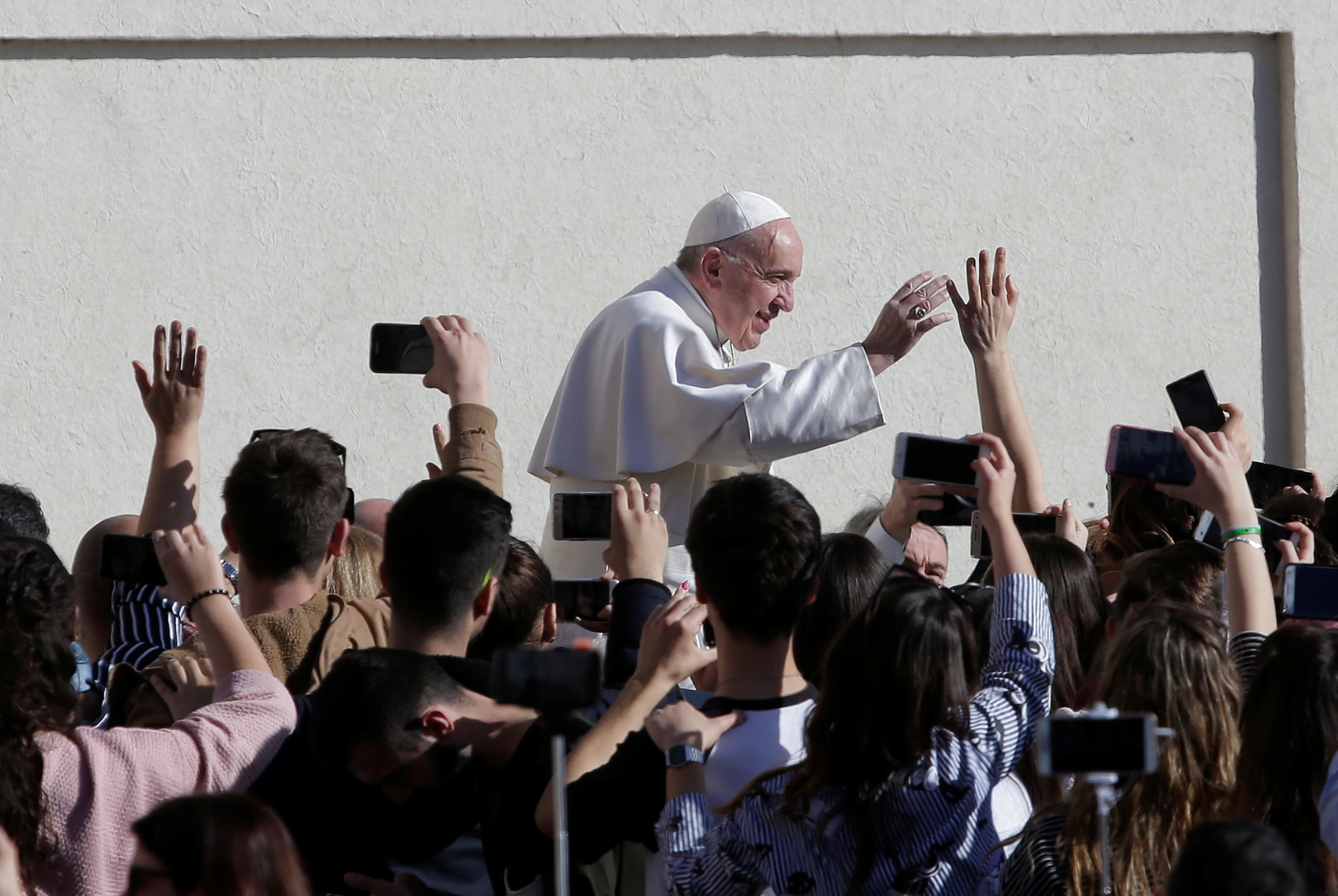Why conservative Catholics think Pope Francis is a fraud
For starters, the pope often talks like a progressive


It's been four years since Pope Francis kicked off one of the most striking papacies in memory. Within the Catholic world, sadly divided into warring political camps, he is seen as a hero by progressive Catholics and a scourge of conservatives.
Why do so many conservatives dislike Pope Francis? In many cases, because he makes noises they dislike.
Francis has had harsh words against globalized capitalism, has written a major encyclical on the environment, and has been a major supporter of migrants in the crisis seizing Europe. In all these controversies, he actually hasn't strayed too far from Catholic orthodoxy. But the most charitable version of the conservative critique, which is not unjustified, is that his tone and emphasis make him sound like a straightforward progressive, and risks identifying the Magisterium of the Church with the progressive left.
The Week
Escape your echo chamber. Get the facts behind the news, plus analysis from multiple perspectives.

Sign up for The Week's Free Newsletters
From our morning news briefing to a weekly Good News Newsletter, get the best of The Week delivered directly to your inbox.
From our morning news briefing to a weekly Good News Newsletter, get the best of The Week delivered directly to your inbox.
Then there are the hot-button, below-the-belt issues. Pope Francis clearly would like to overturn Catholic doctrine saying that the faithful who are divorced and civilly remarried but have not received an annulment must refrain from receiving holy communion. He has walked right up to the line of overturning that doctrine, insulted those who oppose the move, and winked heavily at those Catholics who take a "Who am I to judge?" approach to communion. Conservatives fear that Francis' actions represent tentative first steps down a dangerous slippery slope. Is this the beginning of an eventual undoing of all of Catholicism's ancient and countercultural teachings on sexual ethics? If he goes too far, could he create a new schism within the Church?
I'm sympathetic to all of these critiques. But here's the thing: One of the key endeavors of modernity has been to separate religion and politics; but paradoxically, the result of trying to separate them often makes them collapse together. When religion is turned into a private hobby, people turn politics into another kind of religion. My point is that what makes a pope's legacy isn't political. It's spiritual.
And Pope Francis' spiritual legacy is extremely powerful. His incessant reminders to Catholics to stand in solidarity with the poor and to, in their daily life, build a "culture of encounter" over and against a "throwaway culture" that treats things as disposable is right in line with the gospel — and sorely needed.
More profoundly, the key theme of Francis' papacy has been "mercy." As Francis' predecessor Pope Emeritus Benedict XVI marveled in his latest book, Pope Francis' message of mercy seems like the most important message Christianity can give to addled modernity. On the one hand, too many moderns see Christianity as a judgmental, rigid, hypocritical religion; stressing that the Gospel of Jesus Christ is a gospel of mercy is important. More importantly, perhaps, modern life can all too often look like an endless rat race for success, whether in economic life or in the insane dating and mating game, where the only thing the individual has to rest on is himself. In such stress-filled lives, being able to call upon the mercy of a God of love is a priceless gift.
A free daily email with the biggest news stories of the day – and the best features from TheWeek.com
Moreover, while the pope's predecessors have been academics, this pope is a pastor. I'm extraordinarily grateful for the immense contributions that John Paul II and Benedict XVI have made to the theology of the Church. At the same time, it's important to realize that in Catholicism, the power of the pope's office doesn't come from intellect, but from prophetic voice. Pope Francis speaks to everyone in layman's terms, and his admonitions keep bringing people back to the here and now. We can hear bromides about caring about the poor all day every day and not change; the idea of a "culture of encounter," however, is concrete. It's not just about writing a check or having a bleeding heart, however important that may be, it's about real people, in your real life, right now, who are the face of Christ, and who need you. That's a real challenge, and I'm grateful to the pontiff for making it.
In the conclave that elected the successor to Pope Benedict, the cardinals were looking for something very specific: not a new spiritual message or a rejiggering (or worse) of doctrine, but someone who could fix a scandal-plagued Curia. On these topics, Francis at first made some very promising moves, changing up departments and appointing new people, in particular, to reform the Church's finances and step up enforcement of pedophilia cases. In both cases, however, the efforts seem to have stalled. Francis' money reformer, Cardinal Pell, has been quietly neutered with the pontiff's blessing after a successful bureaucratic guerilla campaign. The body Francis set up to toughen enforcement of child abuse cases seems to be falling apart. Of course Francis would much prefer the headlines about the Church to be about the progressive-conservative civil war (and both sides certainly give him fodder for it).
We live in an age of populism, and hailing from a country that has practically defined it, Francis is himself a kind of populist: plain-spoken, with little regard for fusty rules and institutions, and occasionally vicious with political adversaries. His legacy might be that of so many populist insurgencies: Even the good ideas failed because of lack of skillful implementation.
Pascal-Emmanuel Gobry is a writer and fellow at the Ethics and Public Policy Center. His writing has appeared at Forbes, The Atlantic, First Things, Commentary Magazine, The Daily Beast, The Federalist, Quartz, and other places. He lives in Paris with his beloved wife and daughter.
-
 Must-see bookshops around the UK
Must-see bookshops around the UKThe Week Recommends Lose yourself in beautiful surroundings, whiling away the hours looking for a good book
-
 A Nipah virus outbreak in India has brought back Covid-era surveillance
A Nipah virus outbreak in India has brought back Covid-era surveillanceUnder the radar The disease can spread through animals and humans
-
 Nasa’s new dark matter map
Nasa’s new dark matter mapUnder the Radar High-resolution images may help scientists understand the ‘gravitational scaffolding into which everything else falls and is built into galaxies’
